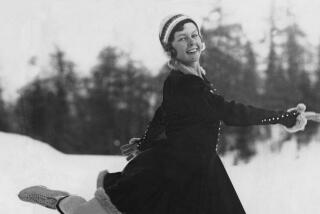Boosting Blair Next Task for Pickwick Club
- Share via
In theory, it would stand to be a ratings joke.
Think about it. You are the president of a television network, locked in a financial life-or-death struggle with your two major rivals. You are faced with one of the crucial sweeps periods, when the number of viewers you attract will determine the amount of advertising dollars you can charge.
You learn that the other two networks are stockpiling the usual mix of miniseries, blockbuster movies, all-star specials and local newscasts filled with titillating exposes like sex at the Laundromat, all in the name of Nielsen numbers.
Your programming chief tells you he has a better idea. For a mere $309 million, he can get you 16 consecutive nights of athletes nobody in America has ever heard of, often engaged in sports few Americans have ever seen.
We’ll have four big East Europeans jumping into a bobsled. We’ll have figure skaters, skiers, the kind of stuff nobody watches every week on Wide World of Sports.
We’ll have curling, sort of shuffleboard on ice, in which the biggest action consists of a couple of guys with brooms madly sweeping away. Sort of like watching the ground crew at a baseball game, without getting to see the game.
But don’t worry, This is the Winter Olympics. It won’t all be sports nobody’s heard of. You’ll get ice hockey, too. You remember ice hockey, which got booted off network TV because nobody wanted to watch even when they had heard of half the players.
Now the immediate temptation is to tell this programming genius to take his puck and go home. But that’s only if you fail to take into consideration the Olympic phenomenon. It works every time. Stamp the logo with the five interlocking rings on a sport, pull out the flags and the people will respond. It doesn’t matter who or what they’re watching.
A prime example was the 1984 Summer Games right here in our back yard. They were packing them in for events like team handball?
Team handball? Two weeks later, you could have given a free demonstration in downtown L. A. at rush hour and nobody would have stopped to watch.
But the Olympics are unique, a point proven once again these past few weeks when ABC’s prime-time telecasts have usually blown away the opposition.
Now such a flash of brilliance is sufficient for ABC, but others would like to capture this lightning in a bottle. Enough of this loved-watching-see-you-in-four-years bit.
Take speed skating, for example. Some people take it very seriously. But not a lot of people. There are only an estimated 3,000 speed skaters in the entire country, 60 in Southern California.
Nearly half of the 60 belong to the Pickwick Speed Skating Club, headquartered at the Pickwick Ice Arena in Burbank. Every Monday night, they meet to skate in relative anonymity.
But that was before Bonnie Blair. Since the Illinois skater raced across the ice to help herself to the gold a week ago, Jim Wigney, coach of the Pickwick club, is discovering friends he didn’t know he had. Despite the fact he’s moved this week into a new home in Westwood, Wigney has been tracked down by people who suddenly want to join the club.
At work, he’s been greeted with, “So that’s what you guys do. Wow!”
Wigney’s club is accustomed to elite skaters. One of its members, Charles King of Studio City, was among the top eight finalists in the competition to make the four-man U. S. squad in Calgary.
People are predicting Blair will be the new Mary Lou Retton, that you won’t be able to go into a store or eat your Wheaties without staring her in the face. Wigney wouldn’t mind. It’s the kind of spark his sport needs.
Wigney has seen this before, back in 1980 when Eric Heiden won five gold medals for the United States.
“That created an explosion of interest,” Wigney says. “But it’s a job, a big job, to keep it going.
“In skiing, they hire promoters to handle the publicity and the grass-roots building. And there are 800 zillion manufacturers to keep skiing in the limelight. We are going to need a major effort on a volunteer basis. We don’t have promoters. We do not have that many manufacturers.”
But now, they do have Bonnie Blair.
More to Read
Go beyond the scoreboard
Get the latest on L.A.'s teams in the daily Sports Report newsletter.
You may occasionally receive promotional content from the Los Angeles Times.






